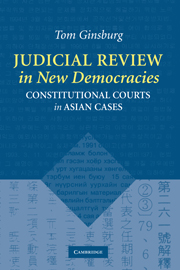Book contents
- Frontmatter
- Contents
- Acknowledgments
- Notes on Usage
- Judicial Review in New Democracies
- Introduction: The Decline and Fall of Parliamentary Sovereignty
- 1 Why Judicial Review?
- 2 Constituting Judicial Power
- 3 Building Judicial Power
- 4 Courts in New Democracies
- 5 Confucian Constitutionalism? The Grand Justices of the Republic of China
- 6 Distorting Democracy? The Constitutional Court of Mongolia
- 7 Rule by Law or Rule of Law? The Constitutional Court of Korea
- 8 Conclusion: Comparing Constitutional Courts
- Bibliography
- Index
2 - Constituting Judicial Power
Published online by Cambridge University Press: 21 July 2009
- Frontmatter
- Contents
- Acknowledgments
- Notes on Usage
- Judicial Review in New Democracies
- Introduction: The Decline and Fall of Parliamentary Sovereignty
- 1 Why Judicial Review?
- 2 Constituting Judicial Power
- 3 Building Judicial Power
- 4 Courts in New Democracies
- 5 Confucian Constitutionalism? The Grand Justices of the Republic of China
- 6 Distorting Democracy? The Constitutional Court of Mongolia
- 7 Rule by Law or Rule of Law? The Constitutional Court of Korea
- 8 Conclusion: Comparing Constitutional Courts
- Bibliography
- Index
Summary
What determines the character of judicial review as it operates in new democracies? One important factor is the institutional design of the court and access to it, which is the subject of this chapter. The institutional design of the judicial review mechanism is generally, though not always, a product of the written constitution itself. As such, it reflects, in large part, the choices of the constitutional designers. The political bargain struck at the outset of the democratic regime and embodied in the constitutional text will frequently include some provisions for judicial review. Some important features of the judicial review body, such as its jurisdiction, composition, and selection method of its members, may be detailed in the constitutional text.
Text is not the only source of judicial power, however. This qualification is necessary both because some systems of judicial review are not derived from constitutional text (the systems in Israel and the United States are two well-known examples), but also because nonconstitutional norms may be important in shaping the environment of judicial review. Frequently, matters such as terms and procedures are listed in ordinary organic statutes of the judicial review body. Furthermore, judicial decisions themselves will fill in many of the gaps in these frameworks. Particularly important are decisions related to jurisdiction and standing that play a major role in a court's self-articulation of its political role.
This chapter is primarily concerned with the institutional choices embodied in written constitutions and their importance in setting the stage for judicial review.
- Type
- Chapter
- Information
- Judicial Review in New DemocraciesConstitutional Courts in Asian Cases, pp. 34 - 64Publisher: Cambridge University PressPrint publication year: 2003



